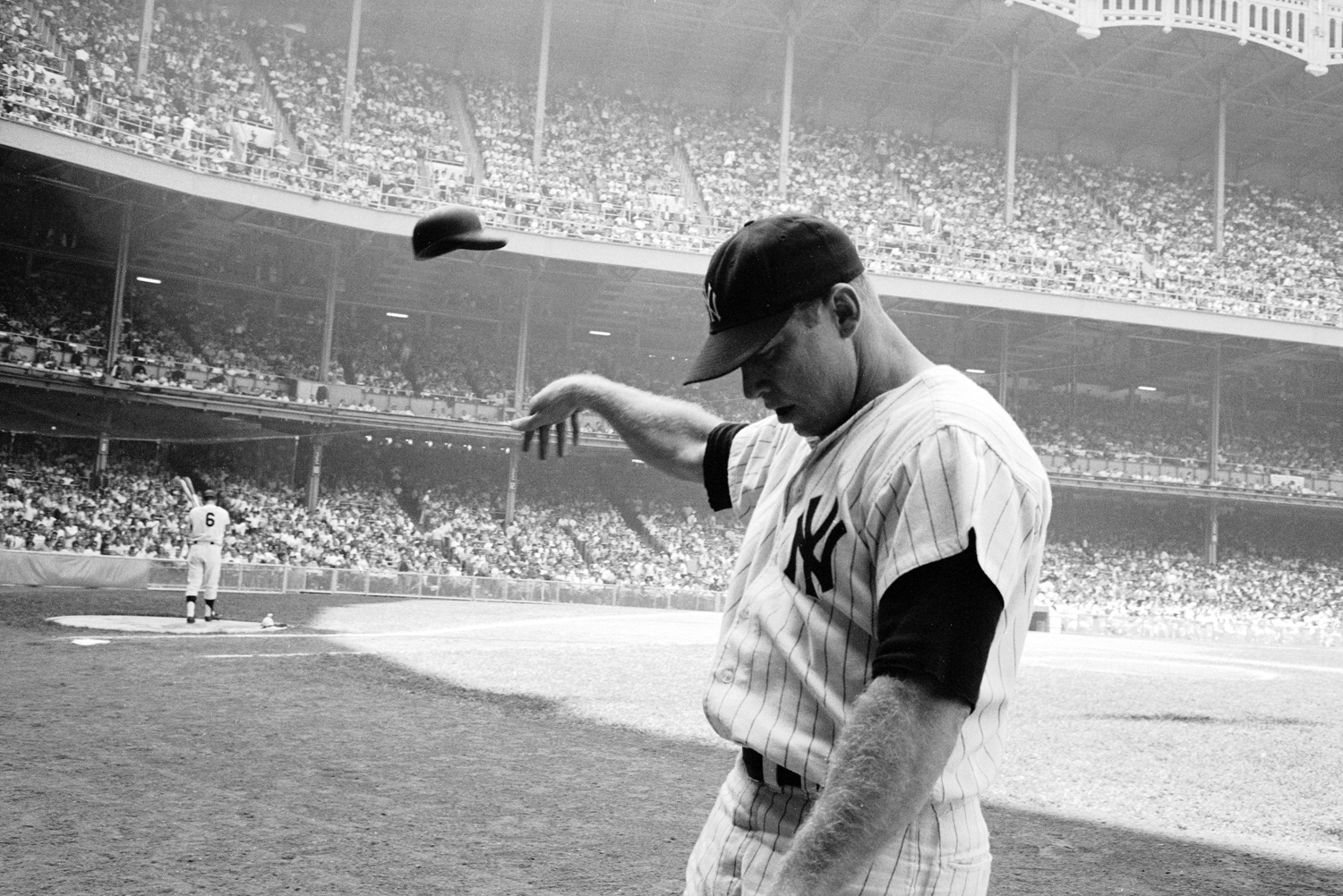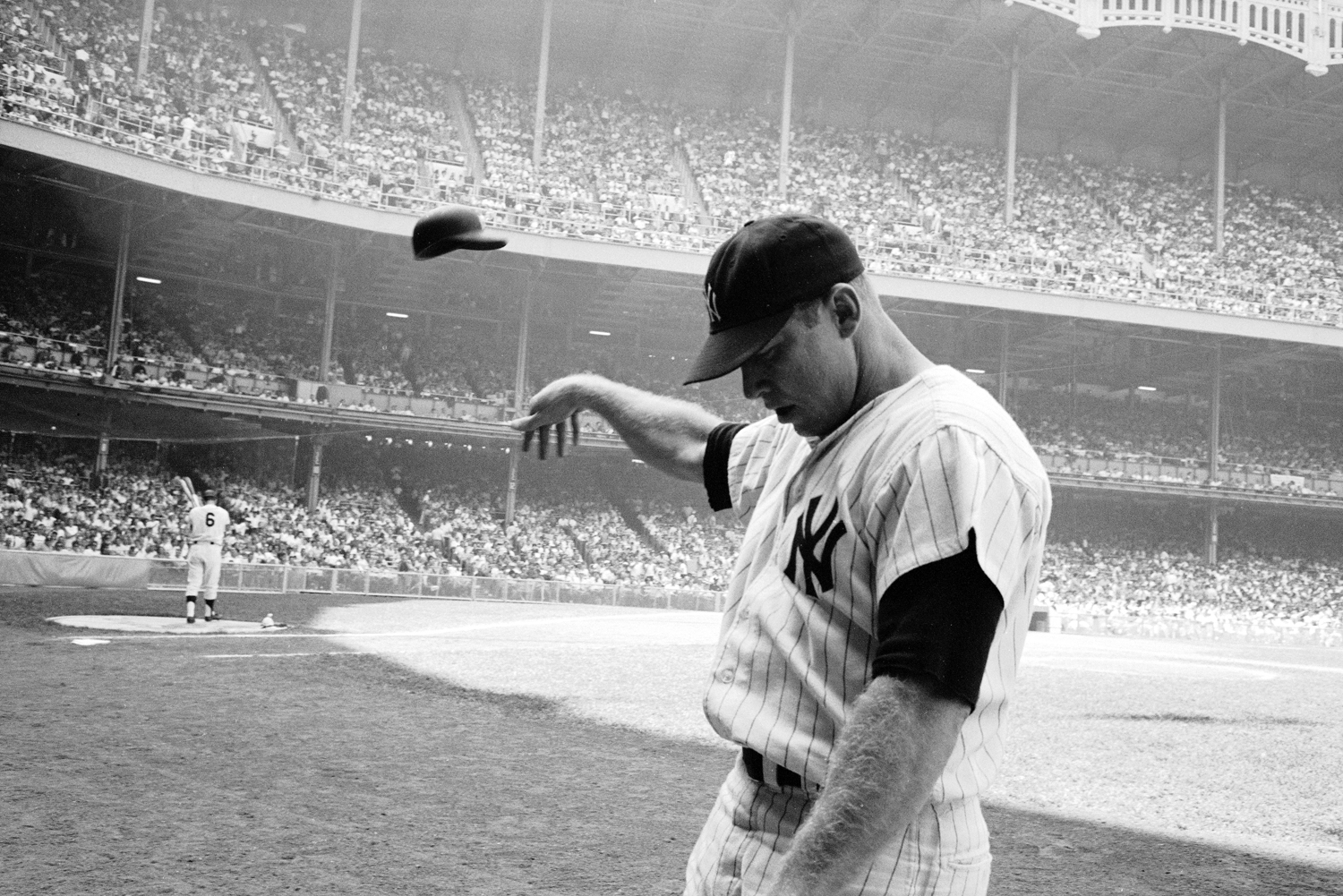
The greater the athlete, the tougher it is to leave the arena. History is filled with examples of players, in pretty much every sport, who should have hung up their spikes, or their skates, or their racquets long before they finally retired but simply would not—could not—leave at the top of their game. Brett Favre, Michael Jordan, Willie Mays, Gordie Howe—in the eyes of so many fans, the legacy of these and countless other Hall of Famers would have been far brighter if they had finally left the locker room a few years earlier.
Granted, one can also point to a number of greats who left at the top of their game—Jim Brown, Steffi Graf, the amazing Sandy Koufax—but the list of those who stuck around for too long is far lengthier, and for sports fans, far more fun to debate. (Did Emmitt Smith really retire later than he should have?)
One name high on most lists of players who dragged it out a little bit at the end is that of legendary Yankees center fielder Mickey Mantle. By all accounts one of the greatest natural talents to ever play the game, Mantle could do it all—and for several years, from the mid-1950s through the early ’60s, he was a dominant force on the diamond. A seven-time World Series champ, three-time MVP and one of only 17 Triple Crown winners, Mantle still holds records for, among other things, the most World Series home runs (18), RBIs (40) and total bases (123) and is remembered not only for his blazing speed and his stellar glove, but for the almost unbelievable power he packed into his 5-foot-11, 195-pound frame.
In 1953, for example, the switch-hitting Mantle (batting right-handed) famously slammed a homer that, while it almost certainly didn’t travel the 565 feet claimed by the Yankee’s public relations man, Red Patterson, is still widely regarded as one of the very longest ever hit. Over the course of his 18 seasons in the pros, in fact, Mantle hit many home runs so freakishly far that they left fans and fellow players stunned.
[MORE: “Mickey Mantle: Glory and Pain”]
As electrifying a player as Mantle was, however, from his early days in the big leagues he was plagued by injuries great and small—until, at the end, his legs were so thoroughly wrapped and bandaged on game days that he literally hobbled to the plate to hit. (Years of alcohol abuse certainly didn’t help matters.)
The John Dominis picture featured here, meanwhile, remains not just one of the best photos of Mickey Mantle, and not just one of the finest baseball pictures to run in LIFE magazine, but one of the most powerful photographs ever made of a sports hero in decline. Shot during a meaningless game at Yankee Stadium during the team’s abysmal 1965 season—the Yankees finished below .500 for the first time in 40 years—Dominis’s picture of Mantle tossing his helmet in disgust after a lousy at-bat distills in a single frame the wounded pride of the inexorably fading athlete.
[See all of TIME.com’s sports coverage]
Whether it’s a boxer who can no longer dodge an opponent’s jab, or a tennis player no longer nimble enough to return a rocket of a serve, all athletes eventually face that moment when their bodies simply can’t perform at the highest level. The competitive fire might burn as hot as ever, but the hands grow weaker, the legs heavier, the lungs shallower. After a certain point, no matter how much experience and craft an athlete has, time and age become the true and only rivals.
And yet . . . in Dominis’ marvelous, riveting photograph, there remains something defiant, something unbroken, in the ballplayer’s gesture—even as we know, and even as the fans at the time knew, that Mantle’s days as a formidable player were gone forever. The graceful, almost balletic posture of the hand that tosses the helmet; the prodigious strength so evident in Mantle’s muscled forearm and, indeed, in his entire frame—these details, captured so perfectly by Dominis, remind us that even in decline, the truly great athlete retains something of the physical magnetism that made us stand and cheer in the first place.
Ben Cosgrove is the Editor of LIFE.com

More Must-Reads from TIME
- Donald Trump Is TIME's 2024 Person of the Year
- Why We Chose Trump as Person of the Year
- Is Intermittent Fasting Good or Bad for You?
- The 100 Must-Read Books of 2024
- The 20 Best Christmas TV Episodes
- Column: If Optimism Feels Ridiculous Now, Try Hope
- The Future of Climate Action Is Trade Policy
- Merle Bombardieri Is Helping People Make the Baby Decision
Contact us at letters@time.com